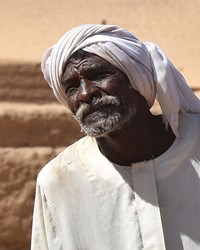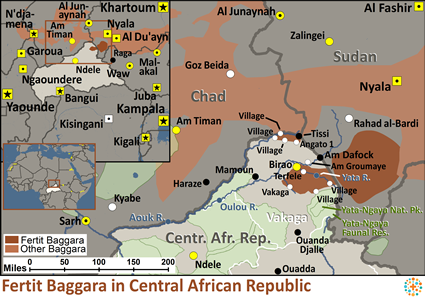Shuwa Arabs are commonly referred to as the "Baggara." This name is derived from the Arabic word bagar, meaning "cow," and refers to the Arab tribes in West Africa who are cattle herders. They are spread from the Lake Chad region eastward to the Nile River in the countries of Sudan, Niger, Chad, Cameroon, Nigeria, and the Central African Republic. They live in a hot, semi-arid climate with zones ranging from sparse shrub lands to wooded grasslands. Baggara tribes are of Arab descent and mainly speak the Shuwa dialect of the Arabic language. They entered western Sudan between the twelfth and thirteenth centuries and have gradually moved east and west from there. By the eighteenth century, they were concentrated primarily to the north and east of Lake Chad. Their tribes continued moving eastward until they became widely scattered across the horizontal plains of West Africa. They have intermarried with the tribes who lived close to them. They have their own clans and subgroups, one of which is the Fertit.
Fertit Baggara in the CAR are unable to raise camels because of the thicker vegetation and more humid climate. Most Fetit Baggara tribes in CAR are nomadic. Each year the herds are moved south to the river lands during the dry season, and north to the grasslands during the rainy season. Before changing locations, Baggara people plant sorghum, sesame, millet, and beans in their fields, harvesting the crops on their return. Roles of the Baggara men and women are very distinct. The women are responsible for milking the cows. They sell the raw milk to factories, and processed milk either at the marketplace or door to door. They keep the earnings or use them to pay household expenses. Women also build the houses, tend to the children, go for water, prepare the daily meals, and trade in the marketplace. Fertit Baggara men are primarily involved with caring for herds. They also plant and harvest crops. Although the mother is the primary caretaker of the children the father may also show affection or discipline them. Since women are capable of adequately maintaining the household, the men will sometimes leave for one or two years at a time to work in other countries to bring in needed income. Baggara depend heavily on their animals for survival. The people feed on milk and cheese during the winter. They use animal fat and dung as healing ointments. They use the skins to make clothing and tents, and the bones ornaments and weapons. Baggara live in simple dome-shaped tents built by the women. They are portable structures that can easily be packed and moved along with the herds. When preparing to set up a new camp, the bed for the woman and small children is built first, then the tent is put up around it. They erect these tents by placing saplings into holes in the ground, then bending them over and tying them at the top. Then they tie smaller branches into the frame, then cover the frame with thatch or grass mats. They arrange their tents in a circle, and they bring their cattle inside at night so they don't wander or get stolen. Married women own the tents and their housekeeping contents. The men build a "sun shelter" either inside or just outside of the camp. They gather there to eat, talk, nap, or entertain their friends. Although most Fertit Baggara tribes are nomadic, there are a few that live in farming communities or towns. Their houses are built of mud bricks and have thatched roofs. Corrals for the young animals are built inside the compounds. Fertit Baggara marriages are often polygamous. If a man has two wives, one of them may live in a pastoral camp, while the other lives in a farming village. The two households exchange products and labor, adding to the family's income and making it more flexible.
Most Baggara tribes are nomadic and depend entirely on their animals for survival.
Fertit Baggara in CAR have been Muslims since the thirteenth century. They wear the clothes prescribed by the Muslim religion, and bury their dead facing Mecca, the "holy city" of Islam. Baggara people believe strongly in evil spirits. Each morning a man sneezes to rid his nostrils of the evil spirit who slept there the night before. They also believe that men and women can be changed into animals such as were-crocodiles and were-hyenas. These people for whom Lord Jesus laid down his life, depend upon good works to pay the penalty for their sins. They depend upon the spirit world for their daily needs because they regard Allah as too distant. They believe that Allah may determine their eternal salvation, but the spirits determine how well they live in their daily lives. Consequently, they must appease the spirits. They often use charms and amulets to help them with spiritual forces.
The nomadic lifestyle of Baggara people results in difficult access for anyone who wants to help them raise their standard of living. Their Muslim value system is also unlike the truth of the gospel, making communication and acceptance unlikely.
Ask the Lord to call out prayer teams to go and break up the soil through worship and intercession. Pray that Christian believers living in West Africa will be stirred with vision for outreach and a genuine burden to reach out to the Fertit Baggara tribes in the CAR. Ask the Lord to raise up strong disciples and local reproducing churches among this unreached people.
Scripture Prayers for the Baggara, Fertit in Central African Republic.
| Profile Source: Joshua Project |


























